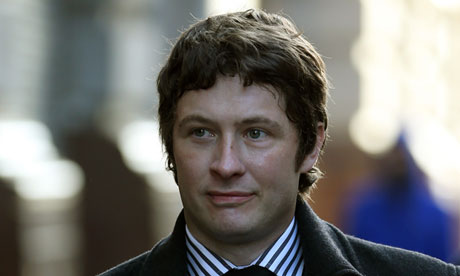Baha Mousa army doctor found guilty of dishonest conduct
Derek Keilloh has repeatedly denied any knowledge of injuries suffered by Iraqi hotel worker who died in British custody

Derek Keilloh has been found guilty at a medical tribunal of misleading and dishonest conduct after the death of Baha Mousa. Photograph: Dave Thompson/PA
A medical tribunal will on Monday consider whether a former army doctor is fit to continue to practise after finding that he acted in a misleading and dishonest way after the death of Baha Mousa, a Basra hotel worker who died in British military custody in Iraq in 2003.
Derek Keilloh also failed to protect other detainees, said a panel of theMedical Practitioners Tribunal Service (MPTS) yesterday. Keilloh, who had denied any cover-up, had claimed he only saw dried blood around the nose of Mousa, who had 93 separate injuries after being arrested and beaten by soldiers.
The hotel receptionist, who had been hooded with a sandbag for 24 hours, sustained injuries including fractured ribs and a broken nose during the final 36 hours of his life in the custody of the 1st Battalion, Queen's Lancashire Regiment. Keilloh, who now works as a GP in Mayford House surgery in Northallerton, North Yorkshire, denied any knowledge of such injuries.
The MPTS panel, sitting in Manchester, is part of the General Medical Council, the doctors' professional regulator. It said Keilloh knew of the injuries to Mousa but failed to conduct an adequate examination of the body. He also failed to assess other detainees, protect them from further mistreatment or tell senior officers what was going on.
Keilloh, then a 28-year-old regimental medical officer, was called to a detention centre at the British Army HQ in Basra in September 2003 where Mousa, 26, was unconscious after a violent incident with soldiers. He and other medical staff apparently made every possible attempt to save Mousa's life and there was no criticism in this regard, said the panel. But Keilloh failed to make an adequate examination of Mousa's body when he knew the detainee had sustained injuries.
Keilloh had also failed to bring to attention of senior officers the injuries to Mousa and the possible mistreatment of two other detainees. The panel was satisfied that he should have suspected foul play.
He had also engaged in "misleading and dishonest" conduct when, at courts martials and a subsequent public inquiry, he maintained under oath that he saw no injuries to Mousa's body. The tribunal will now decide whether his behaviour amounts to misconduct, and if so, what the penalty should be. It has the power to suspend or strike off doctors.
While the injuries to Mousa were the responsibility of British soldiers, there were "clearly failings by others with responsibility towards the detainees to have safeguarded their welfare", said the panel.
Daniel Leader, from law firm Leigh Day, who represented the Mousa family, said Mousa was "an entirely innocent man who was beaten to death." The ruling "sends a clear message that just because a doctor is a soldier or in a theatre of war, their ethical responsibilities are not diminished".
Keilloh made no reaction as Brian Alderman, chairman of the panel hearing the case, delivered its verdict. The case has already lasted 42 days, with much of the hearing held in private. The decision on the facts of the case ran to 57 pages.
In all there were 51 individual allegations, 30 already admitted, 17 found proved and four not proved.
Lawyers for the GMC, which is prosecuting the case, and for Keilloh, asked for time to digest the findings. The panel will sit again on Monday.
No comments:
Post a Comment